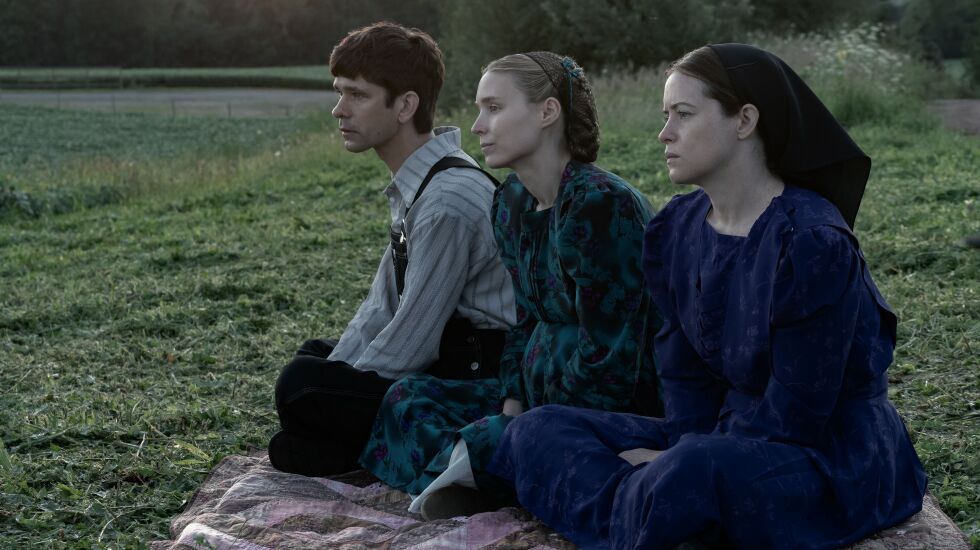
The women are putting it to a vote, and there are three choices:
Do Nothing.
Stay and Fight.
Leave.
The “Do Nothing” choice on the ballot is represented by a sketch of a meadow, while “Stay and Fight” is in a column depicting a man and woman engaged in battle, and the “Leave” option is shown as a drawing of horse as seen from behind. These drawings are necessary because the women casting these votes have not been allowed to learn how to read or write, and they’ll be marking their choices with an “X,” and that is how the fate of the community will be decided.
Once the votes are cast, the real talking will begin.
This is the premise of the writer-director Sarah Polley’s “Women Talking,” a stark and riveting and quietly powerful adaptation of Miriam Toews’ 2018 novel, which was inspired by the horrific, real-life events in a Mennonite community in Manitoba County in Bolivia, where more than 130 women and girls had been repeatedly anesthetized and raped. Though the subject matter is intense and shocking, the intuitively sensitive and subtle Polley teams with a brilliant ensemble cast to tell the story with grace and empathy and even some much-needed doses of earned humor. It’s a film you won’t soon forget.
“Women Talking” is set in a cloistered, Mennonite-like community and takes place in the year 2010, though the setting and garb and language feel more of the 19th century. As we learn from a young girl’s voice-over narration, the women and girls have been drugged to the point of unconsciousness and raped repeatedly over an extended period of time: “When we woke up feeling hands that were no longer there, the elders told us it was the work of ghosts or Satan, or that we were lying to get attention, or that it was an act of wild female imagination. … It went on for years, to all of us …”
After one of the attackers was caught and identified, “he named the others,” we’re told. The assailants were taken to the city by police and the remaining men in the colony made the journey to town to post bail, and all will return in approximately 48 hours. “We were given two days to forgive the attackers,” says our narrators. If not, they will be banished and denied entry into heaven. Hence that vote, and the three choices.
Save for a few flashbacks (Polley wisely refrains from depictions of the brutal attacks and shows just glimpses of the aftermaths) and brief exterior shots, “Women Talking” is set almost entirely in a barn where the women have gathered, with cinematographer Luc Montpellier employing a desaturated technique that veers close to monochromatic. It’s an effective means of giving the story a timeless, almost surreal touch.
And what a cast! Frances McDormand has only a brief appearance (but is as great as you’d expect her to be) as the leader of “Do Nothing” movement, who makes a hasty exit after the “Stay and Fight” and “Leave” options split the great majority of the vote. Judith Ivey plays the elder Agata, who has two grown daughters: Ona (Rooney Mara), who is pregnant from one of the attacks and has an almost saintly presence, and Salome (Claire Foy), who is burning with rage and wants to do battle.
Sheila McCarthy is another matriarch, Greta, with two daughters of her own: Mariche (Jessie Buckley) and Mejal (Michelle McLeod). On the fringes of the debate, frolicking about and too young to truly understand what is happening, are Autje (Kate Hallett) and her friend Nietje (Liv McNeil). Also present is a recent returnee to the community named August (Ben Whishaw), who will take notes and is clearly in love with Ona and also aware there is precious little chance they’ll ever be together. (Eventually, another key character is introduced in August Winter’s Melvin, the community’s daycare leader, who has recently transitioned.)
That’s an abundance of characters to keep track of — but thanks to the strong writing and the distinctive performances from each member of the cast, and Polley’s nimbleness in affording everyone at least one showcase moment, we’re able to keep track of the various storylines and the passionate positions each character holds as they engage in a debate against the clock, a debate that will decide not only their fate but the fates of their children and grandchildren and generations to come.
The women are talking. It would do us well to listen.







